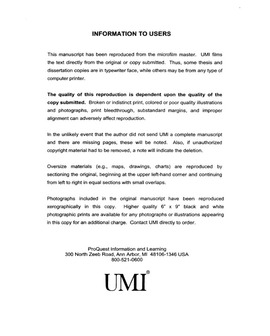| dc.description.abstract | In Timely Materialisms: Modernism, Subjectivity, and Language I examine some major figures in literary modernism in relationship to the critique of scientific positivism, particularly as it plays out in the human sciences. My argument is that while modernism in its earliest stages can be seen as shaped by the assumptions of positivism, it soon turns toward the critique of these assumptions. The two leading positivist assumptions under critique are the notions of disinterested subjectivity and linguistic transparency. In place of these assumptions emerge various post-positivist notions in which language is seen as a form or discourse that shapes the apprehension and understanding of the world, instituting or founding the subject in the process. These notions, I argue, mark the emergence of a more subtle materialism than positivism, one that attends to the discursive effects of language and the socially constructed nature of subjectivity. Because these materialist notions finally attempt to effect an historicizing of understanding---locating subjectivity in relationship not only to the changing forms of language and culture, but also to the experience of modernity---I have termed them "timely materialisms." I begin my study with an extended reflection on the relationship between modernism, positivism, and modernity, arguing that the crisis and critique of positivism can be historicized if it is seen as a necessary outcome of the experience of modernity. Next, I examine the articulation of the crisis of positivism in Joseph Conrad's The Secret Agent, which is deeply involved with Caesar Lombroso's criminal anthropology. Finally, as the principle instances of timely materialisms, I examine various works by Gertrude Stein, James Joyce, and Virginia Woolf. First, I link Stein to Henri Poincare and the crisis of Euclidean geometry, and then I discuss Joyce in relationship to Walter Benjamin and the crisis of historicism. Finally, I conclude with an analysis of Woolf in relationship to Martin Heidegger and hermeneutic ontology. The overall significance of this study is that it clarifies modernism's relationship to the Enlightenment as well as to postmodernism. In other words, modernism, as a period, can be seen as critiquing the Enlightenment and as anticipating postmodernism. | en_US |
